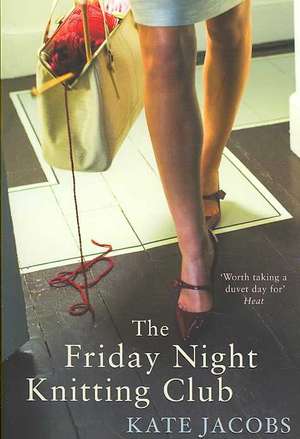The Friday Night Knitting Club
Autor Kate Jacobsen Limba Engleză Paperback – 20 sep 2007
| Toate formatele și edițiile | Preț | Express |
|---|---|---|
| Paperback (2) | 50.23 lei 3-5 săpt. | +27.26 lei 6-12 zile |
| Hodder & Stoughton – 20 sep 2007 | 50.23 lei 3-5 săpt. | +27.26 lei 6-12 zile |
| Penguin Books – 31 dec 2007 | 90.52 lei 3-5 săpt. |
Preț: 50.23 lei
Preț vechi: 64.55 lei
-22% Nou
Puncte Express: 75
Preț estimativ în valută:
9.62€ • 9.89$ • 8.11£
9.62€ • 9.89$ • 8.11£
Carte disponibilă
Livrare economică 07-21 februarie
Livrare express 23-29 ianuarie pentru 37.25 lei
Preluare comenzi: 021 569.72.76
Specificații
ISBN-13: 9780340922194
ISBN-10: 0340922192
Pagini: 432
Dimensiuni: 133 x 197 x 29 mm
Greutate: 0.31 kg
Editura: Hodder & Stoughton
Locul publicării:United Kingdom
ISBN-10: 0340922192
Pagini: 432
Dimensiuni: 133 x 197 x 29 mm
Greutate: 0.31 kg
Editura: Hodder & Stoughton
Locul publicării:United Kingdom
Recenzii
"The book's great-worth reading now." -- Glamour "If you are looking for an inviting group of gals to spend a few winter evenings with, pull up your afghan and snuggle in with The Friday Night Knitting Club...[It] makes you yearn for yarn, even if you're not a knitter." -- USA Today "Impossible to put down." -- Booklist "Knitters will enjoy seeing the healing power of stitching put into words. Its simplicity and soothing repetition leave room for conversation, laughter, revelations and friendship-just like the beauty shop in Steel Magnolias." -- Detroit Free-Press "Poignant twists propel the plot and help the pacing find a pleasant rhythm." -- Publishers Weekly
Extras
Open Tuesday through Saturday, 10 am-8pm.
No exceptions!
The hours of Walker and Daughter: Knitters were clearly displayed in multicolored letters on a white sandwich board placed just so at the top of the stair landing. Though Georgia Walker—usually preoccupied with closing out the till and picking up the strays of yarn on the floor—rarely made a move to turn the lock until at least eight fifteen…or later.
Instead, she sat on her stool at the counter, tuning out the traffic noise from New York's busy Broadway below, reflecting on the day's sales or prepping for the beginner’s knitting class she taught every afternoon to the stay-at-homes looking for some seeming stamp of authentic motherliness. She crunched the numbers with a pencil and paper, and sighed. Business was good, but it could always be better. She tugged at her long, chestnut curls. It was a habit from years ago she’d never quite grown out of and by the end of each day her bangs often stood straight up. Once the bookkeeping was in order, she'd smooth out her hair, brush off any bits of eraser from her jeans and soft jersey top, her face a bit pale from concentration and lack of sun, and stand up to her full six feet (thanks to the three-inch heels on her well-worn brown leather cowboy boots).
Slowly she would walk around the shop, running her hands lightly over the piles of yarn that were meticulously sorted by color—from lime to Kelly green, rust to strawberry, cobalt to Wedgwood blue, sunburst to amber, and rows and rows of grays and creams and blacks and whites. The yarn went from exquisitely plush and smooth to itchy and nubbly and all of it was hers. And Dakota's too, of course. Dakota, who at twelve frequently ignored her mother's instructions, loved to cross her dark eyes and savor the fuzzed-out look of the colors all merging, a rainbow blending together.
Dakota was the store mascot, one of its chief color consultants (more sparkles!), and frankly, a pretty damn good knitter already. Georgia noticed how quickly her daughter was making her projects, how particular she was becoming about the tautness of her stitches. More than once she'd been surprised to see her not-so-little-anymore girl approach a waiting customer and say with confidence: "Oh, I can help you with that. Here, we'll take this crochet hook and fix that mistake…" The shop was a work in progress; Dakota was the one thing she knew she'd done exactly right.
And yet when Georgia finally went to turn out the lights of her shop, she would often be met by a potential customer, all furrowed brow and breathless from dashing up the steep stairs to the second-floor shop, the seemingly innocuous "Can I just pop in, for a quick minute?" out of her mouth before Georgia could even insist they were done for the night. She'd open the door a little wider, knowing all too well what it was like to juggle work and kids and still try to sneak in a little something for herself on the side: reading a book, coloring her hair in the bathroom sink, taking a nap. Come in, get what you need, she'd say, putting off the short climb to her sparsely decorated apartment on the floor above. She never let any straggler stay past nine on a school night, though, because she needed to shoo her Dakota from the corner desk where she did her homework. But Georgia would never turn away a potential sale.
She'd never turn away anyone at all.
"You can go home, Anita," Georgia would say over her shoulder to the trusted friend who worked in the shop alongside her. Anita always stayed until closing time, peeking in on Dakota's studies as Georgia wondered about keeping the older woman out too late. But even though she had the opportunity to leave, Anita, who still looked as fresh in her Chanel pantsuit as when she'd come in for her shift at three pm, just smiled and shook her head, her silver bob falling neatly into place.
Then Georgia would step out of the doorframe to let in the straggler, a resigned smile revealing the beginnings of tiny crinkles around her calm, green eyes. Here we go again, her face seemed to say. But she was grateful for every person who walked through the door and took the time to make sure they had what they needed.
"Every sale is also a future sale—if you please the customer." Georgia often bored Dakota with her various theories on business. "Word of mouth is the best advertising."
And her biggest booster was Anita, who sensed when the day had been too long for Georgia and leaped in to assist. "I'd be delighted to help you," Anita often said, coming up to Georgia's side and reaching out to the last-minute shopper, ushering her inside. Anita knew and loved the nubbly textures and patterns as well as Georgia did; both had been introduced to the craft by grandmothers eager to share their secrets. Talking about knitting with the customers at Walker and Daughter was Anita's passion—second only to working with the needles herself.
Anita was captivated with the craft from the moment her Bubbe asked her, as a chubby-cheeked youngster, to hold a skein of thick, warm yarn. She watched her grandmother work the needles quickly, fashioning the hunter-green string into a small, smooth cardigan. With thick buttons for little fingers to grasp. And when that same grandmother presented the finished sweater to Anita…well, a knitter was born. Soon she was placing her hands over that same grandmother's as she learned how it felt to work the wool, then mastered tying her first slipknot and relished the excitement of casting on for the first time. As a young woman, Anita kept up knitting to make herself the angora twinsets her parents couldn't afford, then to cuddle up her babies in thick blankets and booties while her husband worked on building his business. She just kept at it—long after she needed to make clothes for her family, long after her husband's hard work had built a life that was more than comfortable—and then, when she was well into middle age, she threw out the pattern books and began experimenting with patterns and color to create unique designs. A mother of three grown sons and grandmother to seven (handsome and genius) youngsters, Anita was surprised to add up the years and realize that she had been working with yarn for most of her seventy-two years. "Anita is an artist, and knitting is her medium" was what her husband, Stan, always told people who admired the colorful vests he insisted on wearing to the office. Stan. He had been so proud of her, encouraging her to work with Georgia all those years ago; she began going to the shop one day a week to test it out. Anita had had no need for the money and she worried that she seemed silly to work at her age.
"Does it make you happy?" Stan had asked her after her first day, and she admitted that yes, yes, it did, as she rolled into his arms. Then keep at it, he murmured, keep at it.
Over time, young Dakota began to seem like another grandchild—especially precious because Anita could see her whenever she wanted, unlike her own children and grandchildren, who had all moved away to Israel, Zurich, Atlanta. There were cards and phone calls, of course, but it wasn't the same; Anita had long harbored a fear of planes, and all the psychologists and Valium in the world couldn't fix it. Her grandchildren grew so much between each visit that it was like getting to know a new person all over again. And then one day Stan was gone, too. A quick peck as she sat at the breakfast table with toast crumbs still on her lip, a sudden heart attack riding in the elevator to his top-floor office, a phone call telling her to take a cab to Beth Israel right now, then hearing there was nothing more anyone could do. And so it went.
Stan had taken care of the details as always, so she had no reason to worry about the bills. But financial security just wasn't enough. Anita was alone. Really and truly on her own. She cried as she lay in bed, sleeping or with magazines piled all around her. And then, one month after the funeral, she got up, put on her lipstick and pearls, and made her way to see Georgia.
"There are more and more customers each day and you're going to run behind on your projects-for-hire, Georgia," she had said. "You need someone in here full-time and I need to keep busier than to just work one day a week." It was the truth. Dakota was two then, and Georgia had recently expanded from creating projects on commission to selling yarn and notions. She had worked hard to make her business float, had even worked the six-to-twelve shift for Marty in the deli below the apartment building, toasting bagels and pouring to-go cups of coffee. Branching out into sales meant she may soon be able to give up the second job and spend more time with Dakota.
They agreed that Anita would come in for the afternoon shift during the week. When Georgia tried to insist on a dollar figure, Anita was adamant she would only work for yarn.
"When the store is a booming success, then you can pay me," she suggested that day ten years before.
Of course, the shop—with careful planning, slow growth, and a lot of hope—had grown into something of a hit. Over the years, it had even popped up in mentions of local haunts in papers and such; recently an article in New York on mompreneurs had featured Walker and Daughter.
"Sure thing, it might bring your classmates and their moms into the shop," Georgia had said when Dakota wanted to take the story to school. She planned to drop off her little girl at the front entrance as she did every morning, then go home to open up the shop. A quick hug and see you later; the usual. Instead, Dakota surprised her mother as she wheeled around, her winter coat already unzipped and revealing the bright turquoise sweater that accented her warm, café-au-lait skin. It was one of Georgia's creations. Dakota spoke, pointing to the article in triumph, then dashed into the door before the buzzer sounded. Georgia barely remembered the walk home, fumbled with the keys to the shop before her face became wet with heavy tears as she let the years of fear and hard work wash out of her, Dakota's casual "I'm proud of us, Mom" ringing in her ears.
Anita continued to work only for yarn, and when she wanted to start a personal knitting project—she still made vest after vest even though Stan had been gone for a decade—she simply went to the shelf and chose something exquisite. When she wanted a hug, she wrapped her arms around Dakota. And that was that. It was enough.
So Anita always let out a deep breath upon seeing this last-minute customer skate into the store, felt the ball in her stomach begin to unwind. A few more minutes to be needed, a further delay to keep her from going home to the apartment at the San Remo that remained too big and too empty. "Oh, come on in," she'd say over Georgia's mild protests, walking right over to help the client. "Tell me what you need…"
And so the door at Walker and Daughter was open a little bit late and eventually a little bit later than that. Soon enough, at the end of the long workweek, a few regular customers took to popping in with their knitting—sweaters and scarves and cell-phone socks—and asking questions about all the mistakes they'd made while commuting on the subway.
"I just can't get the buttonhole right!"
"Why do I keep dropping stitches?"
"Do you think I can finish it by Christmas?"
Without ever putting up one sign or announcing the creation of a knitting club, these women began regularly appearing in the evenings and, well, loitering. Chatting with each other, talking to Anita, gathering about the large round table in the center of the room, picking up where they had left things the week before. And then, one Friday last fall, it became official. Well, sort of.
Lucie, a striking woman with short, sandy-colored hair, who favored tortoiseshell glasses over her big, blue eyes and colorful, funky outfits, was an occasional shopper at Walker and Daughter. She came in every few months and was always working on the same piece, a thick cable knit sweater--a man's garment. There were a lot of these types who came in to the store, folks whose knitting ambitions were out of line with either their ability or with whatever mysterious comings and goings kept them from sitting down and getting the job done.
But Lucie began appearing more and more often in the early evening, gazing wistfully at the fancier yarns but typically choosing a good-quality wool that was just this side of inexpensive. Some days she sauntered in with a leather attaché and suit jacket slung over her arm as if she'd come from a big meeting. At other times, she looked relaxed in slim-fitting cigarette pants and a messenger bag draped across her body. But without fail she had a single bag of groceries in her hand, the makings of a simple supper, which she carefully placed on the counter as she paid for her yarn. After talking to Lucie on several visits, Anita understood that she was pretty fair with a set of needles but simply couldn't find the time to get going. "You could always knit here," Anita suggested idly, not thinking much of it. And then, one Friday, Lucie simply pulled up a chair at the table and began to do her knitting right then and there. And Dakota, who had been idly milling about and rolling her eyes and making noises about being bored and wanting to go to the movies, sat right down beside her.
"That's pretty," said Dakota, impulsively reaching out to stroke the top of the sparkling gemstone Lucie wore on her right hand.
"Yes, I bought it for myself," said Lucie, with a smile that recalled happy times, but offered no more explanation. Dakota shrugged, then reached out to look at the big, thick sweater Lucie had on round needles.
"I'm pretty good, you know," she said, nodding, putting out a hand to take a look at Lucie's stitches. Lucie laughed, kept clacking away. "I'm sure you are," she said, without looking up.
And then Anita sat down, ostensibly to keep Dakota in check. Other shoppers joined them at the table and suddenly, unexpectedly, it was a group. On a whim, Lucie pulled out the fresh box of bakery cookies she had just picked up at Fairway and had planned to savor over the weekend; instead, she offered them around. The polite no, thank-yous echoed until Dakota declared that she most certainly would enjoy a treat, and then the laughter sliced through the awkwardness and they each took one cookie, and then another. And somehow, between mouthfuls, they began to show one another what they had been working on. Anita talked buttonholes and dropped stitches, and then she offered to put on a fresh pot of coffee in the back. More cookies, more conversation. It became late, too late to really stay on, and the women packed up their bags and made motions to move but lingered, reluctant to leave. It was Dakota who declared she'd bring muffins to the next meeting. Next meeting? I might be busy, the women said. I don't know if I can commit. Let me check my calendar. But the next week, Lucie did show up. Dakota brought her muffins. Georgia even sat down with them. And so the Friday Night Knitting Club emerged.
Six months later, the club was going strong even as the winter drew to a close. Lucie had finished her sweater and started another; Dakota was making a regular mess in the kitchen in their apartment above, experimenting with everything from pinwheel cookies to blondies to decorated cupcakes. "Ever heard of June Cleaver?" Georgia would tease her. Big sigh from her sweet brown-eyed little girl who kept growing bigger.
"Yeah, I've seen TV Land, Mom."
Then: "It's for club, Mom, the ladies are hungry!" A beat. "What do you think about selling my creations?"
Ah, she'd raised another independent businesswoman with vision. It felt good.
Dakota's bake sale plans never came to pass—"No, Dakota, this Walker still outranks the daughter!"—but the group continued to grow anyway. People told their friends, and women would stroll in after meeting up for drinks or a nosh. Coming to the Friday Night Knitting Club became a bit of a thing to do—different enough to be fun, refreshing in that it wasn't just another place to meet men.
One such drop-in—a woman who came once but never came back—mentioned the shop in a casual way to her cousin, Darwin Chiu, who arrived one evening and spoke in hushed tones with Georgia, then sat at the table with a serious expression and a notepad. She was no ordinary customer; in fact, Darwin wasn't a knitter at all. She was a struggling graduate student in search of a dissertation for her doctorate in women's studies. The knitting club became her primary resource for thesis research. A compact Asian-American woman in her late twenties, Darwin was all business. In the beginning, she rarely smiled; she just furiously scribbled and later moved on to interviewing the members of the club about their "obsession with knitting."
"How do you feel knitting connects with your conceptions of femininity?" Darwin asked of one quiet M.D. who had popped by at the end of her shift. The doctor never entered the shop again.
"Does being an older knitter make you feel disconnected from the younger trendsetters?" she asked Anita.
"No, love, it makes me feel young," Anita replied. "Every time I cast on I feel the potential of making something beautiful."
At first, Georgia tolerated Darwin because she was amused by her earnestness and because she admired the seriousness with which Darwin approached her studies. Not to mention that she felt a certain sense of pride to have someone choose Walker and Daughter as a worthy place in which to do research. But in short order, Georgia put her foot down.
"You can't harass everyone who comes in here, Darwin," she explained. "You'll have to go if you can't stop interrogating everyone." "Aren't you disturbed that the renewed popularity of knitting is an alarming throwback? Can women who fritter away time on old-fashioned activities such as knitting realize their full professional potential?" responded Darwin, clearly missing the point.
"Disturbed? No, encouraged is more like it. As in, I'm encouraged I can afford to send Dakota to Harvard." Georgia's mouth was a straight line. Knitting had done more than provide her with a living; it had soothed her soul through more struggles than she could count. "Sweetheart, I'm concerned you're preventing my shop from reaching its full professional potential!"
The two women stood glaring at each other for a long time. Darwin eventually turned on her heel and left.
And then she returned, two weeks later, watching Georgia warily as she arrived for club. Their eyes met, the agreement unspoken: You can stay, but don't upset the clients. Darwin nodded imperceptibly. She selected one of Dakota's muffins—carrot spice—and gave it a try. It was a first. "Hey, this is awesome!" She was genuinely surprised. Dakota was thrilled, told her she could request next week's flavor.
"I'm glad you're back," said Anita. Darwin looked up, expecting to see sarcasm but found only warmth and welcome in Anita's eyes. A wide grin spread over her face. She was embarrassed to admit it, even to herself, but Darwin was glad to be back. She had missed them.
Officially, Georgia was nonplussed by the presence of the club. "You all sit here and no one buys anything!" she would say to Anita during the day. Sometimes, when they had a lot of drop-ins, she hung back at the counter. It felt overwhelming to have this group here, laughing and chatting. Her entire adult life had centered on work and her little girl for so long that Georgia felt out of practice at just hanging out with women of her own age. She'd felt awkward unless she was helping them to calculate how many balls they needed for this pattern or that. But she loved that Anita had an activity for her mornings, getting revved up about whatever knitting topic she would discuss that week, and that Dakota was happy to stick around the store on a Friday night and not retreat to watch the TV upstairs.
Keeping Dakota safe, making her happy: That was what mattered most to Georgia. The store was truly theirs together, because it was Dakota who began it all. And savoring the end of each day that they were still in business—and doing well, thank you very much!—was a triumph for Georgia. She had been awash in panic when she discovered she was pregnant, barely out of college and working for poverty wages as an assistant at an amorphous publishing conglomerate. Her boyfriend, James, had dumped her the month before, saying he "just wasn't into exclusivity." The truth of it was that he had already started dating a woman in his office. And not just any woman: he was fucking his boss, the lead architect in a major Manhattan firm.
Georgia had wanted James the first time she saw him at Le Bar Bat, had felt a connection to this tall, handsome black man. She tugged at her curls, walked over to him, and popped the question: "I like my eggs scrambled for breakfast. You?" It was a gambit. James looked at her with cool authority; he liked what he saw, charmed her with his lopsided grin. First waiting at the bar to get drinks, then standing off to the side shout-talking until the middle of the night. They went home together, something she'd always been too cautious to do, Georgia feeling that she had been chosen, believing everyone looked at her with envy. And without even having a big discussion about it, they became a couple. Going to parties and to the movies and meeting for egg rolls after work. James was energetic and filled with big ideas, he loved to save up for more than a month so he could take them to luxurious restaurants like Le Cirque or wait in line to buy half-price tickets to Broadway shows. Other nights they stayed in, Georgia reading manuscripts in bed, James working at the battered old drafting table taking up most of his living room. They were young, often broke, and infused with the energy and passion that fills the New York air. The relationship was easy, comfortable, exciting. It was meant to be. For eight months, they shuttled back and forth between apartments, had late-night chats in which they discussed whose furniture they'd keep when they moved in together, walked hand-in-hand through the city streets fantasizing about where they should live. The Upper West Side, they decided. Georgia recalled nights in bed with James, her pale hand tracing lines on his dark chest as she would ask in a sing-song voice, "Will it reeealllly bother your family that I'm white?" and he'd laugh and say, "Hell, yes!" They fell to giggles and tickles, empowered by the intensity of their recent lovemaking and disbelieving their relationship would fall to any challenge.
She never did meet his parents. She only realized that after he was gone.
And then James had moved on, having let himself into her apartment during the day and gathered up his clothes. He returned her things from his home, left them piled on the couch. Georgia's mind swirled. She called him, screamed, begged him to come back. She stopped eating, stopped sleeping, then began eating way too much. Snickers bars and Pringles and giant bagels with cream cheese, soda and ice cream and pizza and cookies. She ate anything she could get her hands on. Anything cheap and filling.
"If you keep eating like that, everyone will think you're preggers," observed her wafer-thin, pain-in-the-ass cubiclemate.
A pause. Georgia did the math: Her period was late. Way late. And then she knew.
Should she take it on the chin and go back home to small-town Pennsylvania? Could she endure the humiliation of moving back home to her parents, of being a single mom with a failed big-city career at twenty-four? Or should she call her doctor and then just pretend the pregnancy had never happened? Georgia fretted over her lack of appealing options, in between photocopying endless manuscripts and opening looming piles of other people's mail and running out to buy the oversized, fat-free muffins her boss never ate.
Her indecision was her decision, and it became clear that she and this baby were going to stick together. Then came the day when Georgia, visibly pregnant, made her final pilgrimage to Central Park. It was to be her last weekend in the city before she moved home to her parents; she'd dialed them when there was no going back and choked out the news, feeling brave and sorry for herself at the same time.
"We'd be happy to have you home with us," said her father with gusto, before being drowned out by his wife's sighs.
"You've made a stupid mistake by trusting this man, Georgia," said her mother. "It's clear he only wanted one thing. And you've set yourself up a hard road to hoe ߝ not everyone will be as welcoming to this child as we are."
Georgia could see her mother's tight-lipped expression in her mind; it was one she'd seen many times growing up. She could barely hear them discuss the details of which train she might take; she was too overwhelmed by emotional regret and physical nausea.
The day was a scorcher. The air conditioner in her Upper West Side walk-up had konked out, leaving her sweat-soaked and uncomfortable. Her dark curly hair had frizzed and stuck to the back of her neck, her belly jutted out of her slender frame, and her fingers, always so slim and nimble, were swollen. Her eyes were red, puffy. Georgia had finally worked up the nerve to call James late one night and reveal the pregnancy. He was shocked, angry, apologetic…and bedded down with his newest girlfriend. And no, she wasn't his boss. He had already found someone else. "This isn't a really good time for me…perhaps we can meet tomorrow? At the park?" And so she made her way that morning to an empty bench under the trees, sat down with the half-finished blanket she was knitting for her baby-to-be, and waited. James never showed.
"That's an impressive pattern you've worked out there." Georgia was startled by the elegant older woman standing before her, her linen suit still crisp and a wide-brimmed sun hat framing her face. Georgia smiled weakly, embarrassed by her cheap clothes, her fat belly, her youth.
The woman sat down anyway, began talking about the blankets she had knitted for her own children and about how working the needles always helped her sort out her emotions. Georgia just wanted her to go away, but she had been raised to be a good girl, so she pretended to listen politely. Tears of rage and frustration stung her eyes.
"You don't find very many people who can knit with this type of precision," she heard the woman say as she fingered the piece. "It's a dying art, and one I imagine people would pay for." She reached over and patted Georgia's left hand; there was no ring, but the woman knew that already.
"If I were you, I might start asking around, see if anyone needed sweaters or scarves for gifts. Perhaps see if you can put up a sign at the baby store over on Broadway and 76th? Get the word out. You could buy a classified ad in the New Yorker—it worked for Lillian Vernon."
Georgia sat there, at a loss for words, doubt and confusion oozing from every pore. The woman stood up to leave, motioned to a man in the distance.
"You have a gift, my dear, and I have an eye for talent." She handed Georgia a cream calling card on heavy stock. "Just to prove it to you, I'll buy the first sweater you make. Make it cashmere, and make it quickly. I'll expect a call when it's done." Her heels made a soft clip-clop on the sidewalk as she walked away.
Georgia turned over the card.
Anita Lowenstein. The San Remo. 212-555-9580.
No exceptions!
The hours of Walker and Daughter: Knitters were clearly displayed in multicolored letters on a white sandwich board placed just so at the top of the stair landing. Though Georgia Walker—usually preoccupied with closing out the till and picking up the strays of yarn on the floor—rarely made a move to turn the lock until at least eight fifteen…or later.
Instead, she sat on her stool at the counter, tuning out the traffic noise from New York's busy Broadway below, reflecting on the day's sales or prepping for the beginner’s knitting class she taught every afternoon to the stay-at-homes looking for some seeming stamp of authentic motherliness. She crunched the numbers with a pencil and paper, and sighed. Business was good, but it could always be better. She tugged at her long, chestnut curls. It was a habit from years ago she’d never quite grown out of and by the end of each day her bangs often stood straight up. Once the bookkeeping was in order, she'd smooth out her hair, brush off any bits of eraser from her jeans and soft jersey top, her face a bit pale from concentration and lack of sun, and stand up to her full six feet (thanks to the three-inch heels on her well-worn brown leather cowboy boots).
Slowly she would walk around the shop, running her hands lightly over the piles of yarn that were meticulously sorted by color—from lime to Kelly green, rust to strawberry, cobalt to Wedgwood blue, sunburst to amber, and rows and rows of grays and creams and blacks and whites. The yarn went from exquisitely plush and smooth to itchy and nubbly and all of it was hers. And Dakota's too, of course. Dakota, who at twelve frequently ignored her mother's instructions, loved to cross her dark eyes and savor the fuzzed-out look of the colors all merging, a rainbow blending together.
Dakota was the store mascot, one of its chief color consultants (more sparkles!), and frankly, a pretty damn good knitter already. Georgia noticed how quickly her daughter was making her projects, how particular she was becoming about the tautness of her stitches. More than once she'd been surprised to see her not-so-little-anymore girl approach a waiting customer and say with confidence: "Oh, I can help you with that. Here, we'll take this crochet hook and fix that mistake…" The shop was a work in progress; Dakota was the one thing she knew she'd done exactly right.
And yet when Georgia finally went to turn out the lights of her shop, she would often be met by a potential customer, all furrowed brow and breathless from dashing up the steep stairs to the second-floor shop, the seemingly innocuous "Can I just pop in, for a quick minute?" out of her mouth before Georgia could even insist they were done for the night. She'd open the door a little wider, knowing all too well what it was like to juggle work and kids and still try to sneak in a little something for herself on the side: reading a book, coloring her hair in the bathroom sink, taking a nap. Come in, get what you need, she'd say, putting off the short climb to her sparsely decorated apartment on the floor above. She never let any straggler stay past nine on a school night, though, because she needed to shoo her Dakota from the corner desk where she did her homework. But Georgia would never turn away a potential sale.
She'd never turn away anyone at all.
"You can go home, Anita," Georgia would say over her shoulder to the trusted friend who worked in the shop alongside her. Anita always stayed until closing time, peeking in on Dakota's studies as Georgia wondered about keeping the older woman out too late. But even though she had the opportunity to leave, Anita, who still looked as fresh in her Chanel pantsuit as when she'd come in for her shift at three pm, just smiled and shook her head, her silver bob falling neatly into place.
Then Georgia would step out of the doorframe to let in the straggler, a resigned smile revealing the beginnings of tiny crinkles around her calm, green eyes. Here we go again, her face seemed to say. But she was grateful for every person who walked through the door and took the time to make sure they had what they needed.
"Every sale is also a future sale—if you please the customer." Georgia often bored Dakota with her various theories on business. "Word of mouth is the best advertising."
And her biggest booster was Anita, who sensed when the day had been too long for Georgia and leaped in to assist. "I'd be delighted to help you," Anita often said, coming up to Georgia's side and reaching out to the last-minute shopper, ushering her inside. Anita knew and loved the nubbly textures and patterns as well as Georgia did; both had been introduced to the craft by grandmothers eager to share their secrets. Talking about knitting with the customers at Walker and Daughter was Anita's passion—second only to working with the needles herself.
Anita was captivated with the craft from the moment her Bubbe asked her, as a chubby-cheeked youngster, to hold a skein of thick, warm yarn. She watched her grandmother work the needles quickly, fashioning the hunter-green string into a small, smooth cardigan. With thick buttons for little fingers to grasp. And when that same grandmother presented the finished sweater to Anita…well, a knitter was born. Soon she was placing her hands over that same grandmother's as she learned how it felt to work the wool, then mastered tying her first slipknot and relished the excitement of casting on for the first time. As a young woman, Anita kept up knitting to make herself the angora twinsets her parents couldn't afford, then to cuddle up her babies in thick blankets and booties while her husband worked on building his business. She just kept at it—long after she needed to make clothes for her family, long after her husband's hard work had built a life that was more than comfortable—and then, when she was well into middle age, she threw out the pattern books and began experimenting with patterns and color to create unique designs. A mother of three grown sons and grandmother to seven (handsome and genius) youngsters, Anita was surprised to add up the years and realize that she had been working with yarn for most of her seventy-two years. "Anita is an artist, and knitting is her medium" was what her husband, Stan, always told people who admired the colorful vests he insisted on wearing to the office. Stan. He had been so proud of her, encouraging her to work with Georgia all those years ago; she began going to the shop one day a week to test it out. Anita had had no need for the money and she worried that she seemed silly to work at her age.
"Does it make you happy?" Stan had asked her after her first day, and she admitted that yes, yes, it did, as she rolled into his arms. Then keep at it, he murmured, keep at it.
Over time, young Dakota began to seem like another grandchild—especially precious because Anita could see her whenever she wanted, unlike her own children and grandchildren, who had all moved away to Israel, Zurich, Atlanta. There were cards and phone calls, of course, but it wasn't the same; Anita had long harbored a fear of planes, and all the psychologists and Valium in the world couldn't fix it. Her grandchildren grew so much between each visit that it was like getting to know a new person all over again. And then one day Stan was gone, too. A quick peck as she sat at the breakfast table with toast crumbs still on her lip, a sudden heart attack riding in the elevator to his top-floor office, a phone call telling her to take a cab to Beth Israel right now, then hearing there was nothing more anyone could do. And so it went.
Stan had taken care of the details as always, so she had no reason to worry about the bills. But financial security just wasn't enough. Anita was alone. Really and truly on her own. She cried as she lay in bed, sleeping or with magazines piled all around her. And then, one month after the funeral, she got up, put on her lipstick and pearls, and made her way to see Georgia.
"There are more and more customers each day and you're going to run behind on your projects-for-hire, Georgia," she had said. "You need someone in here full-time and I need to keep busier than to just work one day a week." It was the truth. Dakota was two then, and Georgia had recently expanded from creating projects on commission to selling yarn and notions. She had worked hard to make her business float, had even worked the six-to-twelve shift for Marty in the deli below the apartment building, toasting bagels and pouring to-go cups of coffee. Branching out into sales meant she may soon be able to give up the second job and spend more time with Dakota.
They agreed that Anita would come in for the afternoon shift during the week. When Georgia tried to insist on a dollar figure, Anita was adamant she would only work for yarn.
"When the store is a booming success, then you can pay me," she suggested that day ten years before.
Of course, the shop—with careful planning, slow growth, and a lot of hope—had grown into something of a hit. Over the years, it had even popped up in mentions of local haunts in papers and such; recently an article in New York on mompreneurs had featured Walker and Daughter.
"Sure thing, it might bring your classmates and their moms into the shop," Georgia had said when Dakota wanted to take the story to school. She planned to drop off her little girl at the front entrance as she did every morning, then go home to open up the shop. A quick hug and see you later; the usual. Instead, Dakota surprised her mother as she wheeled around, her winter coat already unzipped and revealing the bright turquoise sweater that accented her warm, café-au-lait skin. It was one of Georgia's creations. Dakota spoke, pointing to the article in triumph, then dashed into the door before the buzzer sounded. Georgia barely remembered the walk home, fumbled with the keys to the shop before her face became wet with heavy tears as she let the years of fear and hard work wash out of her, Dakota's casual "I'm proud of us, Mom" ringing in her ears.
Anita continued to work only for yarn, and when she wanted to start a personal knitting project—she still made vest after vest even though Stan had been gone for a decade—she simply went to the shelf and chose something exquisite. When she wanted a hug, she wrapped her arms around Dakota. And that was that. It was enough.
So Anita always let out a deep breath upon seeing this last-minute customer skate into the store, felt the ball in her stomach begin to unwind. A few more minutes to be needed, a further delay to keep her from going home to the apartment at the San Remo that remained too big and too empty. "Oh, come on in," she'd say over Georgia's mild protests, walking right over to help the client. "Tell me what you need…"
And so the door at Walker and Daughter was open a little bit late and eventually a little bit later than that. Soon enough, at the end of the long workweek, a few regular customers took to popping in with their knitting—sweaters and scarves and cell-phone socks—and asking questions about all the mistakes they'd made while commuting on the subway.
"I just can't get the buttonhole right!"
"Why do I keep dropping stitches?"
"Do you think I can finish it by Christmas?"
Without ever putting up one sign or announcing the creation of a knitting club, these women began regularly appearing in the evenings and, well, loitering. Chatting with each other, talking to Anita, gathering about the large round table in the center of the room, picking up where they had left things the week before. And then, one Friday last fall, it became official. Well, sort of.
Lucie, a striking woman with short, sandy-colored hair, who favored tortoiseshell glasses over her big, blue eyes and colorful, funky outfits, was an occasional shopper at Walker and Daughter. She came in every few months and was always working on the same piece, a thick cable knit sweater--a man's garment. There were a lot of these types who came in to the store, folks whose knitting ambitions were out of line with either their ability or with whatever mysterious comings and goings kept them from sitting down and getting the job done.
But Lucie began appearing more and more often in the early evening, gazing wistfully at the fancier yarns but typically choosing a good-quality wool that was just this side of inexpensive. Some days she sauntered in with a leather attaché and suit jacket slung over her arm as if she'd come from a big meeting. At other times, she looked relaxed in slim-fitting cigarette pants and a messenger bag draped across her body. But without fail she had a single bag of groceries in her hand, the makings of a simple supper, which she carefully placed on the counter as she paid for her yarn. After talking to Lucie on several visits, Anita understood that she was pretty fair with a set of needles but simply couldn't find the time to get going. "You could always knit here," Anita suggested idly, not thinking much of it. And then, one Friday, Lucie simply pulled up a chair at the table and began to do her knitting right then and there. And Dakota, who had been idly milling about and rolling her eyes and making noises about being bored and wanting to go to the movies, sat right down beside her.
"That's pretty," said Dakota, impulsively reaching out to stroke the top of the sparkling gemstone Lucie wore on her right hand.
"Yes, I bought it for myself," said Lucie, with a smile that recalled happy times, but offered no more explanation. Dakota shrugged, then reached out to look at the big, thick sweater Lucie had on round needles.
"I'm pretty good, you know," she said, nodding, putting out a hand to take a look at Lucie's stitches. Lucie laughed, kept clacking away. "I'm sure you are," she said, without looking up.
And then Anita sat down, ostensibly to keep Dakota in check. Other shoppers joined them at the table and suddenly, unexpectedly, it was a group. On a whim, Lucie pulled out the fresh box of bakery cookies she had just picked up at Fairway and had planned to savor over the weekend; instead, she offered them around. The polite no, thank-yous echoed until Dakota declared that she most certainly would enjoy a treat, and then the laughter sliced through the awkwardness and they each took one cookie, and then another. And somehow, between mouthfuls, they began to show one another what they had been working on. Anita talked buttonholes and dropped stitches, and then she offered to put on a fresh pot of coffee in the back. More cookies, more conversation. It became late, too late to really stay on, and the women packed up their bags and made motions to move but lingered, reluctant to leave. It was Dakota who declared she'd bring muffins to the next meeting. Next meeting? I might be busy, the women said. I don't know if I can commit. Let me check my calendar. But the next week, Lucie did show up. Dakota brought her muffins. Georgia even sat down with them. And so the Friday Night Knitting Club emerged.
Six months later, the club was going strong even as the winter drew to a close. Lucie had finished her sweater and started another; Dakota was making a regular mess in the kitchen in their apartment above, experimenting with everything from pinwheel cookies to blondies to decorated cupcakes. "Ever heard of June Cleaver?" Georgia would tease her. Big sigh from her sweet brown-eyed little girl who kept growing bigger.
"Yeah, I've seen TV Land, Mom."
Then: "It's for club, Mom, the ladies are hungry!" A beat. "What do you think about selling my creations?"
Ah, she'd raised another independent businesswoman with vision. It felt good.
Dakota's bake sale plans never came to pass—"No, Dakota, this Walker still outranks the daughter!"—but the group continued to grow anyway. People told their friends, and women would stroll in after meeting up for drinks or a nosh. Coming to the Friday Night Knitting Club became a bit of a thing to do—different enough to be fun, refreshing in that it wasn't just another place to meet men.
One such drop-in—a woman who came once but never came back—mentioned the shop in a casual way to her cousin, Darwin Chiu, who arrived one evening and spoke in hushed tones with Georgia, then sat at the table with a serious expression and a notepad. She was no ordinary customer; in fact, Darwin wasn't a knitter at all. She was a struggling graduate student in search of a dissertation for her doctorate in women's studies. The knitting club became her primary resource for thesis research. A compact Asian-American woman in her late twenties, Darwin was all business. In the beginning, she rarely smiled; she just furiously scribbled and later moved on to interviewing the members of the club about their "obsession with knitting."
"How do you feel knitting connects with your conceptions of femininity?" Darwin asked of one quiet M.D. who had popped by at the end of her shift. The doctor never entered the shop again.
"Does being an older knitter make you feel disconnected from the younger trendsetters?" she asked Anita.
"No, love, it makes me feel young," Anita replied. "Every time I cast on I feel the potential of making something beautiful."
At first, Georgia tolerated Darwin because she was amused by her earnestness and because she admired the seriousness with which Darwin approached her studies. Not to mention that she felt a certain sense of pride to have someone choose Walker and Daughter as a worthy place in which to do research. But in short order, Georgia put her foot down.
"You can't harass everyone who comes in here, Darwin," she explained. "You'll have to go if you can't stop interrogating everyone." "Aren't you disturbed that the renewed popularity of knitting is an alarming throwback? Can women who fritter away time on old-fashioned activities such as knitting realize their full professional potential?" responded Darwin, clearly missing the point.
"Disturbed? No, encouraged is more like it. As in, I'm encouraged I can afford to send Dakota to Harvard." Georgia's mouth was a straight line. Knitting had done more than provide her with a living; it had soothed her soul through more struggles than she could count. "Sweetheart, I'm concerned you're preventing my shop from reaching its full professional potential!"
The two women stood glaring at each other for a long time. Darwin eventually turned on her heel and left.
And then she returned, two weeks later, watching Georgia warily as she arrived for club. Their eyes met, the agreement unspoken: You can stay, but don't upset the clients. Darwin nodded imperceptibly. She selected one of Dakota's muffins—carrot spice—and gave it a try. It was a first. "Hey, this is awesome!" She was genuinely surprised. Dakota was thrilled, told her she could request next week's flavor.
"I'm glad you're back," said Anita. Darwin looked up, expecting to see sarcasm but found only warmth and welcome in Anita's eyes. A wide grin spread over her face. She was embarrassed to admit it, even to herself, but Darwin was glad to be back. She had missed them.
Officially, Georgia was nonplussed by the presence of the club. "You all sit here and no one buys anything!" she would say to Anita during the day. Sometimes, when they had a lot of drop-ins, she hung back at the counter. It felt overwhelming to have this group here, laughing and chatting. Her entire adult life had centered on work and her little girl for so long that Georgia felt out of practice at just hanging out with women of her own age. She'd felt awkward unless she was helping them to calculate how many balls they needed for this pattern or that. But she loved that Anita had an activity for her mornings, getting revved up about whatever knitting topic she would discuss that week, and that Dakota was happy to stick around the store on a Friday night and not retreat to watch the TV upstairs.
Keeping Dakota safe, making her happy: That was what mattered most to Georgia. The store was truly theirs together, because it was Dakota who began it all. And savoring the end of each day that they were still in business—and doing well, thank you very much!—was a triumph for Georgia. She had been awash in panic when she discovered she was pregnant, barely out of college and working for poverty wages as an assistant at an amorphous publishing conglomerate. Her boyfriend, James, had dumped her the month before, saying he "just wasn't into exclusivity." The truth of it was that he had already started dating a woman in his office. And not just any woman: he was fucking his boss, the lead architect in a major Manhattan firm.
Georgia had wanted James the first time she saw him at Le Bar Bat, had felt a connection to this tall, handsome black man. She tugged at her curls, walked over to him, and popped the question: "I like my eggs scrambled for breakfast. You?" It was a gambit. James looked at her with cool authority; he liked what he saw, charmed her with his lopsided grin. First waiting at the bar to get drinks, then standing off to the side shout-talking until the middle of the night. They went home together, something she'd always been too cautious to do, Georgia feeling that she had been chosen, believing everyone looked at her with envy. And without even having a big discussion about it, they became a couple. Going to parties and to the movies and meeting for egg rolls after work. James was energetic and filled with big ideas, he loved to save up for more than a month so he could take them to luxurious restaurants like Le Cirque or wait in line to buy half-price tickets to Broadway shows. Other nights they stayed in, Georgia reading manuscripts in bed, James working at the battered old drafting table taking up most of his living room. They were young, often broke, and infused with the energy and passion that fills the New York air. The relationship was easy, comfortable, exciting. It was meant to be. For eight months, they shuttled back and forth between apartments, had late-night chats in which they discussed whose furniture they'd keep when they moved in together, walked hand-in-hand through the city streets fantasizing about where they should live. The Upper West Side, they decided. Georgia recalled nights in bed with James, her pale hand tracing lines on his dark chest as she would ask in a sing-song voice, "Will it reeealllly bother your family that I'm white?" and he'd laugh and say, "Hell, yes!" They fell to giggles and tickles, empowered by the intensity of their recent lovemaking and disbelieving their relationship would fall to any challenge.
She never did meet his parents. She only realized that after he was gone.
And then James had moved on, having let himself into her apartment during the day and gathered up his clothes. He returned her things from his home, left them piled on the couch. Georgia's mind swirled. She called him, screamed, begged him to come back. She stopped eating, stopped sleeping, then began eating way too much. Snickers bars and Pringles and giant bagels with cream cheese, soda and ice cream and pizza and cookies. She ate anything she could get her hands on. Anything cheap and filling.
"If you keep eating like that, everyone will think you're preggers," observed her wafer-thin, pain-in-the-ass cubiclemate.
A pause. Georgia did the math: Her period was late. Way late. And then she knew.
Should she take it on the chin and go back home to small-town Pennsylvania? Could she endure the humiliation of moving back home to her parents, of being a single mom with a failed big-city career at twenty-four? Or should she call her doctor and then just pretend the pregnancy had never happened? Georgia fretted over her lack of appealing options, in between photocopying endless manuscripts and opening looming piles of other people's mail and running out to buy the oversized, fat-free muffins her boss never ate.
Her indecision was her decision, and it became clear that she and this baby were going to stick together. Then came the day when Georgia, visibly pregnant, made her final pilgrimage to Central Park. It was to be her last weekend in the city before she moved home to her parents; she'd dialed them when there was no going back and choked out the news, feeling brave and sorry for herself at the same time.
"We'd be happy to have you home with us," said her father with gusto, before being drowned out by his wife's sighs.
"You've made a stupid mistake by trusting this man, Georgia," said her mother. "It's clear he only wanted one thing. And you've set yourself up a hard road to hoe ߝ not everyone will be as welcoming to this child as we are."
Georgia could see her mother's tight-lipped expression in her mind; it was one she'd seen many times growing up. She could barely hear them discuss the details of which train she might take; she was too overwhelmed by emotional regret and physical nausea.
The day was a scorcher. The air conditioner in her Upper West Side walk-up had konked out, leaving her sweat-soaked and uncomfortable. Her dark curly hair had frizzed and stuck to the back of her neck, her belly jutted out of her slender frame, and her fingers, always so slim and nimble, were swollen. Her eyes were red, puffy. Georgia had finally worked up the nerve to call James late one night and reveal the pregnancy. He was shocked, angry, apologetic…and bedded down with his newest girlfriend. And no, she wasn't his boss. He had already found someone else. "This isn't a really good time for me…perhaps we can meet tomorrow? At the park?" And so she made her way that morning to an empty bench under the trees, sat down with the half-finished blanket she was knitting for her baby-to-be, and waited. James never showed.
"That's an impressive pattern you've worked out there." Georgia was startled by the elegant older woman standing before her, her linen suit still crisp and a wide-brimmed sun hat framing her face. Georgia smiled weakly, embarrassed by her cheap clothes, her fat belly, her youth.
The woman sat down anyway, began talking about the blankets she had knitted for her own children and about how working the needles always helped her sort out her emotions. Georgia just wanted her to go away, but she had been raised to be a good girl, so she pretended to listen politely. Tears of rage and frustration stung her eyes.
"You don't find very many people who can knit with this type of precision," she heard the woman say as she fingered the piece. "It's a dying art, and one I imagine people would pay for." She reached over and patted Georgia's left hand; there was no ring, but the woman knew that already.
"If I were you, I might start asking around, see if anyone needed sweaters or scarves for gifts. Perhaps see if you can put up a sign at the baby store over on Broadway and 76th? Get the word out. You could buy a classified ad in the New Yorker—it worked for Lillian Vernon."
Georgia sat there, at a loss for words, doubt and confusion oozing from every pore. The woman stood up to leave, motioned to a man in the distance.
"You have a gift, my dear, and I have an eye for talent." She handed Georgia a cream calling card on heavy stock. "Just to prove it to you, I'll buy the first sweater you make. Make it cashmere, and make it quickly. I'll expect a call when it's done." Her heels made a soft clip-clop on the sidewalk as she walked away.
Georgia turned over the card.
Anita Lowenstein. The San Remo. 212-555-9580.


















